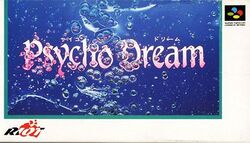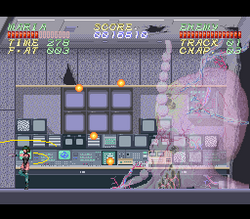Software:Psycho Dream
| Psycho Dream | |
|---|---|
 | |
| Developer(s) | Riot |
| Publisher(s) | Riot |
| Director(s) | Kenichi Nishi |
| Producer(s) | Masayasu Yamamoto Takashi Fukushima |
| Designer(s) | Marino Nishizaki |
| Programmer(s) | Masayasu Yamamoto |
| Composer(s) | Michiko Naruke |
| Platform(s) | Super Famicom, Nintendo Switch |
| Release |
|
| Genre(s) | Platform |
| Mode(s) | Single-player |
Psycho Dream[lower-alpha 1] is a platform game developed and published by Riot for the Super Famicom and released in 1992. Riot was a division of Telenet Japan.
Gameplay
The player takes control of either Ryō or Maria. Ryō is a swordsman while Maria is an angelic warrior who uses either a whip, a laser gun, or metal claws. Demons can even be summoned to destroy most of the monsters on the screen. Many of the stages are set against the backdrop of 20th century Japan.
Having a limited amount of time to defeat enemies, the focus is on advancing through the stages as quickly as possible.
Plot
In the early 1980s, rumors begin to circulate about a new entertainment medium called "D Movie", which allows people to immerse themselves in a world of virtual reality. As D Movies gain traction, a trend emerges of disaffected young people taking permanent refuge in the virtual world while abandoning their physical bodies to atrophy. To retrieve these so-called "Sinkers", Japan's National Public Safety Commission establishes Public Security Division Four (公安四課 Kōan Yonka), nicknamed "Diamond Dog" (ダイアモンドの犬 Daiamondo no Inu), in 1984. The agents who enter the virtual world and perform these rescues are known as Debuggers.
In 1992, a seventeen-year-old girl named Yūki Sayaka (柚木沙耶香) sinks into "Story of the Ruined Capital" (廃都物語 Haito Monogatari), a D Movie directed by David Visconti. Three days pass before she is discovered, and combined with her weak constitution, she is expected to die within twenty-four hours. Two Debuggers, Ryō Shijima and Maria Tobari, are dispatched to rescue her before that happens.
Development and release
Psycho Dream was directed by Kenichi Nishi.[1] It was released in Japan on the Super Famicom on December 11, 1992.[2] A North American localization was planned by Telenet Japan subsidiary Renovation Products, but it was never released.[3] It would have been their second release following Doomsday Warrior.[3] In their 1994 SNES catalog, Nintendo Power mistakenly listed Dream Probe as having been released in September 1993.[4]
Psycho Dream was made available through Nintendo Switch Online on February 17, 2021.[5]
Reception
| Reception | ||||||||||||
|---|---|---|---|---|---|---|---|---|---|---|---|---|
| ||||||||||||
Famitsu gave it an 18/40.[2] Fan reception was mixed: readers of Famimaga voted to give the game a 17.43 out of 30 score, ranking at the number 292 spot in a poll, indicating a middling following.[9] Reviewing the planned localization, three reviewers at Electronic Gaming Monthly gave a score of 5/10 and a fourth gave a 6/10.[6] Super Play gave the game a 33% score.[10] Italian magazine Game Power gave it 75%.[8]
Notes
References
- ↑ Psycho Dream in-game credits
- ↑ 2.0 2.1 2.2 "NEW GAMES CROSS REVIEW: サイコドリーム [スーパーファミコン"]. Famitsu (ASCII Corporation) (209): 38. December 18, 1992. https://archive.org/stream/weekly-famitsu-no.-209-december-18th-1992-600DPI/Weekly%20Famitsu%20-%20No.%20209%20December%2018th%201992%20%28Compressed%29#page/n37/mode/1up. Retrieved 2021-02-13.
- ↑ 3.0 3.1 "Pak Watch Update". Nintendo Power (45): 112. February 1993.
- ↑ "Super Nintendo Entertainment System Power Index". Nintendo Power (56): 2. January 1994.
- ↑ "SNES and NES – Nintendo Switch Online to add Doomsday Warrior, Prehistorik Man, Psycho Dream, and Fire 'n Ice on February 17" (in en-US). 2021-02-10. https://www.gematsu.com/2021/02/snes-and-nes-nintendo-switch-online-to-add-doomsday-warrior-prehistorik-man-psycho-dream-and-fire-n-ice-on-february-17.
- ↑ 6.0 6.1 Harris, Steve; Semrad, Ed; Alessi, Martin; Williams, Ken (May 1993). "Review Crew: Dream Probe". Electronic Gaming Monthly (Sendai Publishing) (46): 26. https://archive.org/stream/Electronic_Gaming_Monthly_46#page/n25/mode/2up.
- ↑ Demoly, Jean-Marc; Morisse, Jean-François (February 1993). "Super Famicom: Balada Dans Un Reve De Schizophrene! - Psycho Dream". Joypad (magazine) (fr) (Yellow Media (publisher) (fr)) (17): 148–149. https://www.abandonware-magazines.org/affiche_mag.php?mag=84&num=1984&album=oui.
- ↑ 8.0 8.1 Dupont (February 1993). "Prove: Psycho Dream". Game Power (it) (Studio Vit (it)) (14): 70–71. https://archive.org/stream/Game-Power-14#page/n71/mode/2up.
- ↑ "90年11月から'93年6月21日発売までの323本を収録!! Super Famicom All Catalog '93 8月情報号特別付録 - サイコドリーム". Famimaga (Tokuma Shoten) (16): 12. August 1, 1993.
- ↑ Cite error: Invalid
<ref>tag; no text was provided for refs namedSPpd
External links
 |


